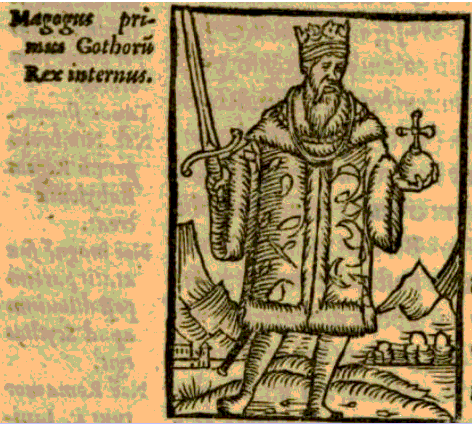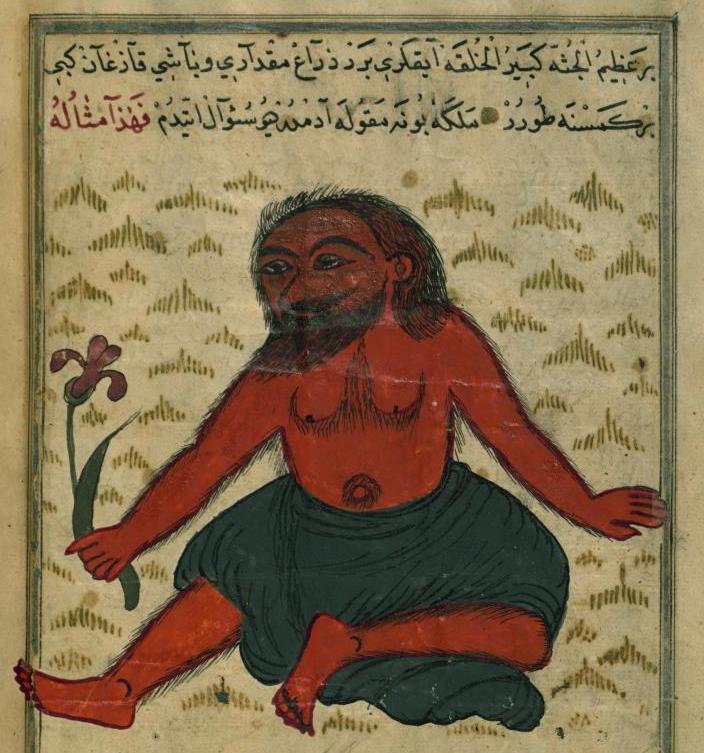Magog (Bible) on:
[Wikipedia]
[Google]
[Amazon]
 Magog (;
Magog (;
 Magog's appearance in the Quran and other Islamic sources is chiefly due to his apocalyptic renown as part of the pairing of Gog and Magog (
Magog's appearance in the Quran and other Islamic sources is chiefly due to his apocalyptic renown as part of the pairing of Gog and Magog (
"George W. Bush et le Code Ezéchiel"
'' Allez savoir !'', no. 39, September 2007. {{Authority control Hebrew Bible nations Book of Genesis people Japheth Book of Revelation Noach (parashah) Gog and Magog Lydia
 Magog (;
Magog (; Hebrew
Hebrew (; ; ) is a Northwest Semitic language of the Afroasiatic language family. Historically, it is one of the spoken languages of the Israelites and their longest-surviving descendants, the Jews and Samaritans. It was largely preserved ...
: מגוג ; Greek: Μαγώγ) is the second of the seven sons of Japheth mentioned in the Table of Nations
The Generations of Noah, also called the Table of Nations or Origines Gentium, is a genealogy of the sons of Noah, according to the Hebrew Bible ( Genesis ), and their dispersion into many lands after the Flood, focusing on the major known soci ...
in Genesis
Genesis may refer to:
Bible
* Book of Genesis, the first book of the biblical scriptures of both Judaism and Christianity, describing the creation of the Earth and of mankind
* Genesis creation narrative, the first several chapters of the Book of ...
.
The origin of the term is not clear, this name indicates either a person, or a tribe, or a geographical reality (country or city). In the book of Ezekiel
Ezekiel (; he, יְחֶזְקֵאל ''Yəḥezqēʾl'' ; in the Septuagint written in grc-koi, Ἰεζεκιήλ ) is the central protagonist of the Book of Ezekiel in the Hebrew Bible.
In Judaism, Christianity, and Islam, Ezekiel is ackno ...
, the pagan Magog people live "north of the World", and metaphorically represent the forces of Evil, which associates it with Apocalyptic traditions.
Etymology
The origin of the name ''Magog'' is unclear. It has been conjectured to come from the Akkadian ''mat Gugi'', "land of Gog", that is, the land ofGyges Gyges can refer to:
* One of the Hecatoncheires from Greek mythology
* King Gyges of Lydia
* Ogyges
* Ring of Gyges
The Ring of Gyges ( grc, Γύγου Δακτύλιος, ''Gúgou Daktúlios'', ) is a hypothetical magic ring mentioned by the ...
: Lydia.
In the Bible
Magog is often associated with apocalyptic traditions, mainly in connection with Ezekiel 38 and 39 which mentions " Gog of the land of Magog, the chief prince of Meshech andTubal
Tubal ( he, תֻבָל, ''Ṯuḇāl'', ), in Genesis 10 (the " Table of Nations"), was the name of a son of Japheth, son of Noah. He is known to be the father of the Caucasian Iberians (ancestors of the Georgians) according to primary sources. ...
" (Ezek 38:2 NIV); on the basis of this mention, " Gog and Magog" over time became associated with each other as a pair. In the New Testament, this pairing is found in the Book of Revelation
The Book of Revelation is the final book of the New Testament (and consequently the final book of the Christian Bible). Its title is derived from the first word of the Koine Greek text: , meaning "unveiling" or "revelation". The Book of ...
20:8, in which instance they may merely be metaphors for archetypal enemies of God.
Ancient and medieval views
Josephus refers to Magog son of Japheth as progenitor of Scythians, or peoples north of the Black Sea. According to him, the Greeks called Scythia ''Magogia''. An alternate identification derived from an examination of the order in which tribal names are listed in Ezekiel 38, "would place Magog between Cappadocia and Media." According to Rabbi Shlomo Ganzfried (19th century) Magog refers to the Mongols. He cites an Arab writer who refers to the Great Wall of China with the name 'Magog'. Jordanes' '' Getica'' (551) mentions Magog as ancestor of the Goths, as does the '' Historia Brittonum'', butIsidore of Seville
Isidore of Seville ( la, Isidorus Hispalensis; c. 560 – 4 April 636) was a Spanish scholar, theologian, and archbishop of Seville. He is widely regarded, in the words of 19th-century historian Montalembert, as "the last scholar of ...
(c. 635) asserts that this identification was popular "because of the similarity of the last syllable" ('' Etymologiae'', IX, 89). Johannes Magnus (1488–1544) stated that Magog migrated to Scandinavia (via Finland) 88 years after the flood, and that his five sons were Suenno (ancestor of the Swedes), Gethar (or Gog, ancestor of the Goths), Ubbo (who later ruled the Swedes and built Old Uppsala
Old or OLD may refer to:
Places
*Old, Baranya, Hungary
*Old, Northamptonshire, England
* Old Street station, a railway and tube station in London (station code OLD)
*OLD, IATA code for Old Town Municipal Airport and Seaplane Base, Old Town, M ...
), Thor, and German. Magnus's accounts became accepted at the Swedish court for a long time, and even caused the dynastic numerals of the Swedish monarchs to be renumbered accordingly. Queen Christina of Sweden reckoned herself as number 249 in a list of kings going back to Magog. Magnus also influenced several later historians such as Daniel Juslenius
Daniel Juslenius (10 June 1676, Mynämäki – 17 July 1752, Skara) was a Finnish writer and bishop. He was a professor of Hebrew, Greek and theology at the Royal Academy of Turku.
Juslenius is considered Finland's first Fennoman and a firm a ...
(1676–1752), who derived the roots of the Finns from Magog.
According to several medieval Irish
Irish may refer to:
Common meanings
* Someone or something of, from, or related to:
** Ireland, an island situated off the north-western coast of continental Europe
***Éire, Irish language name for the isle
** Northern Ireland, a constituent unit ...
chronicles, most notably the '' Auraicept na n-Éces'' and '' Lebor Gabála Érenn'', the Irish race are a composite including descendants of Japheth's son Magog from "Scythia". Baath mac Magog (Boath), Jobhath, and Fathochta are the three sons of Magog. Fenius Farsaid, Partholón, Nemed, the Fir Bolg, the Tuatha de Danann, and the Milesians are among Magog's descendants. Magog was also supposed to have had a grandson called Heber, whose offspring spread throughout the Mediterranean.
There is also a medieval Hungarian legend that says the Huns, as well as the Magyars, are descended from twin brothers named Hunor and Magor respectively, who lived by the sea of Azov
Azov (russian: Азов), previously known as Azak,
is a town in Rostov Oblast, Russia, situated on the Don River just from the Sea of Azov, which derives its name from the town. Population:
History
Early settlements in the vicinity
The mout ...
in the years after the flood, and took wives from the Alans
The Alans (Latin: ''Alani'') were an ancient and medieval Iranian nomadic pastoral people of the North Caucasus – generally regarded as part of the Sarmatians, and possibly related to the Massagetae. Modern historians have connected the Al ...
. The version of this legend in the 14th century ''Chronicon Pictum
The ''Chronicon Pictum'' (Latin for "illustrated chronicle", English: ''Illuminated Chronicle'' or ''Vienna Illuminated Chronicle'', hu, Képes Krónika, sk, Obrázková kronika, german: Illustrierte Chronik, also referred to as ''Chronica Hung ...
'' equates this ''Magor'' with Magog, son of Japheth.
In Islam
 Magog's appearance in the Quran and other Islamic sources is chiefly due to his apocalyptic renown as part of the pairing of Gog and Magog (
Magog's appearance in the Quran and other Islamic sources is chiefly due to his apocalyptic renown as part of the pairing of Gog and Magog (Arabic
Arabic (, ' ; , ' or ) is a Semitic language spoken primarily across the Arab world.Semitic languages: an international handbook / edited by Stefan Weninger; in collaboration with Geoffrey Khan, Michael P. Streck, Janet C. E.Watson; Walte ...
: ''Ya'juj wa Ma'juj''). In sura Al-Kahf
Al-Kahf ( ar, الكهف, ; The Cave) is the 18th chapter (sūrah) of the Quran with 110 verses ( āyāt). Regarding the timing and contextual background of the revelation (''asbāb al-nuzūl''), it is an earlier "Meccan surah", which mean ...
("The Cave", 18:83–98) of the Quran (early 7th century AD), an individual called Dhul-Qarnayn ("The Two-horned One") journeys to a distant land in a pass between two mountains where he finds people who are suffering from the mischief of Gog and Magog. Dhul-Qarnayn then makes a wall of copper and iron to keep Gog and Magog out, but warns that it will be removed in the Last Age. In sura 21, Al-Anbiyā (The Prophets), the wall is mentioned again: there Allah
Allah (; ar, الله, translit=Allāh, ) is the common Arabic word for God. In the English language, the word generally refers to God in Islam. The word is thought to be derived by contraction from '' al- ilāh'', which means "the god", a ...
tells His Prophet ( Muhammad) that there is a "prohibition upon he people ofa city which We have destroyed that they will verreturn, until he dam ofGog and Magog has been opened and thou shall see them, from every higher ground, descending."
In popular culture
*In the season 13 episode ''Good Intentions'' of the TV series '' Supernatural'', Magog appears as a warrior, alongside another named Gog. They battle protagonists Castiel and Dean Winchester. After Dean kills them, Magog and Gog are revealed to be primitive beasts formed of rock and sand, a type of creature Castiel had believed to have gone extinct during the Great Flood. *In the 23-minute epicGenesis
Genesis may refer to:
Bible
* Book of Genesis, the first book of the biblical scriptures of both Judaism and Christianity, describing the creation of the Earth and of mankind
* Genesis creation narrative, the first several chapters of the Book of ...
song Supper's Ready
"Supper's Ready" is a song by the progressive rock band Genesis, recorded for their 1972 studio album ''Foxtrot''. At 23 minutes in length, it is the band's longest recorded song and almost takes up the entire second side of the vinyl. Frontman ...
from 1972 the "Guards of Magog" are mentioned in the 6th section entitled "Apocalypse in 9/8 (Co-Starring the Delicious Talents of Gabble Ratchet)". During live performances of the song lead singer Peter Gabriel would wear an outfit to represent Magog.
*In the TV series Andromeda, the Magog are depicted as a hostile race of aliens who attack earth and decimate its population. They are shown to reproduce by laying eggs in human hosts only to devour the host upon birth.
*In the tabletop RPG Shadow of the Demon Lord, Magog is the name of a powerful Genie who eventually creates the Men of Gog, a race dedicated to destroying the immortal races of the world of Urth.
* On Peter Hammill's album In Camera (1974), there is a song called Gog/Magog (In Bromine Chambers)
* In the Oddworld
''Oddworld'' is a video game series and fictional universe, created by developers Oddworld Inhabitants under the direction of Lorne Lanning. The series has been released on various platforms such as PlayStation, Xbox, PlayStation 3, Game Boy, ...
video game series, the villainous conglomerate opposing the protagonist in every game is named the Magog Cartel.
Notes and references
Bibliography
* Jocelyn Rochat,"George W. Bush et le Code Ezéchiel"
'' Allez savoir !'', no. 39, September 2007. {{Authority control Hebrew Bible nations Book of Genesis people Japheth Book of Revelation Noach (parashah) Gog and Magog Lydia